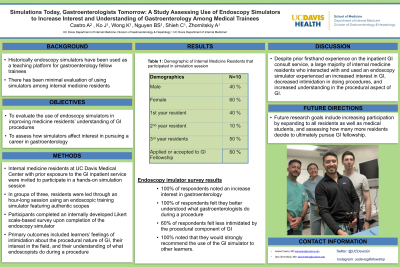Monday Poster Session
Category: General Endoscopy
P2370 - Simulations Today, Gastroenterologists Tomorrow: A Study Assessing Use of Endoscopy Simulators to Increase Interest and Understanding of Gastroenterology Among Medical Trainees
Monday, October 28, 2024
10:30 AM - 4:00 PM ET
Location: Exhibit Hall E

Has Audio
- AC
Astred Eileen Castro, MD
University of California Davis Health Graduate Medical Education
Fairfield, CA
Presenting Author(s)
Astred Eileen Castro, MD1, Jeffrey Ko, MD2, Kimberly Wong, MD3, Bao Sean Nguyen, MD3, Christine Shieh, MD3, Alex Zhornitskiy, MD4
1University of California Davis Health Graduate Medical Education, Fairfield, CA; 2University of California Davis Health Graduate Medical Education, Sacramento, CA; 3University of California Davis Health, Sacramento, CA; 4University of California Davis Medical Center, Sacramento, CA
Introduction: Historically, endoscopy simulators have been used as a teaching platform for gastroenterology fellow trainees. However, there has been little evaluation of how using simulators among internal medicine residents might increase their interest in pursuing a career in gastroenterology or how interacting with simulators can help improve residents’ knowledge of GI procedures.
Methods: Internal medicine residents at UC Davis Medical Center who had previously rotated on the GI inpatient service were invited to participate in a hands-on simulation session guided by a 3rd year GI fellow. The session consisted of an hour-long session using an endoscopy simulator, featuring authentic scopes. After completion of the session, participants completed an internally developed Likert scale-based survey that assessed how the session impacted learners’ feelings of intimidation about the procedural nature of GI, their interest in the field, and their understanding of what endoscopists do during a procedure.
Results: Ten residents participated in the simulation (Table 1). After completing the session, 100% of the residents note that their experience with the simulator increased their interest in GI, 100% felt they better understood what gastroenterologists do during a procedure, 60% felt less intimidated by the procedural component of GI (with the remaining 40% noting no change), and 100% noted that they would strongly recommend the use of the GI simulator to other learners.
Discussion: Even with prior firsthand experience on the inpatient GI consult service and observation of multiple inpatient procedures, a large majority of internal medicine residents who interacted with and used an endoscopy simulator experienced an increased interest in GI, decreased intimidation in doing procedures, and increased understanding in the procedural aspect of GI. Future research goals include increasing participation by expanding to all residents as well as medical students, and assessing how many more residents decide to ultimately pursue GI fellowship.
Note: The table for this abstract can be viewed in the ePoster Gallery section of the ACG 2024 ePoster Site or in The American Journal of Gastroenterology's abstract supplement issue, both of which will be available starting October 27, 2024.
Disclosures:
Astred Eileen Castro, MD1, Jeffrey Ko, MD2, Kimberly Wong, MD3, Bao Sean Nguyen, MD3, Christine Shieh, MD3, Alex Zhornitskiy, MD4. P2370 - Simulations Today, Gastroenterologists Tomorrow: A Study Assessing Use of Endoscopy Simulators to Increase Interest and Understanding of Gastroenterology Among Medical Trainees, ACG 2024 Annual Scientific Meeting Abstracts. Philadelphia, PA: American College of Gastroenterology.
1University of California Davis Health Graduate Medical Education, Fairfield, CA; 2University of California Davis Health Graduate Medical Education, Sacramento, CA; 3University of California Davis Health, Sacramento, CA; 4University of California Davis Medical Center, Sacramento, CA
Introduction: Historically, endoscopy simulators have been used as a teaching platform for gastroenterology fellow trainees. However, there has been little evaluation of how using simulators among internal medicine residents might increase their interest in pursuing a career in gastroenterology or how interacting with simulators can help improve residents’ knowledge of GI procedures.
Methods: Internal medicine residents at UC Davis Medical Center who had previously rotated on the GI inpatient service were invited to participate in a hands-on simulation session guided by a 3rd year GI fellow. The session consisted of an hour-long session using an endoscopy simulator, featuring authentic scopes. After completion of the session, participants completed an internally developed Likert scale-based survey that assessed how the session impacted learners’ feelings of intimidation about the procedural nature of GI, their interest in the field, and their understanding of what endoscopists do during a procedure.
Results: Ten residents participated in the simulation (Table 1). After completing the session, 100% of the residents note that their experience with the simulator increased their interest in GI, 100% felt they better understood what gastroenterologists do during a procedure, 60% felt less intimidated by the procedural component of GI (with the remaining 40% noting no change), and 100% noted that they would strongly recommend the use of the GI simulator to other learners.
Discussion: Even with prior firsthand experience on the inpatient GI consult service and observation of multiple inpatient procedures, a large majority of internal medicine residents who interacted with and used an endoscopy simulator experienced an increased interest in GI, decreased intimidation in doing procedures, and increased understanding in the procedural aspect of GI. Future research goals include increasing participation by expanding to all residents as well as medical students, and assessing how many more residents decide to ultimately pursue GI fellowship.
Note: The table for this abstract can be viewed in the ePoster Gallery section of the ACG 2024 ePoster Site or in The American Journal of Gastroenterology's abstract supplement issue, both of which will be available starting October 27, 2024.
Disclosures:
Astred Eileen Castro indicated no relevant financial relationships.
Jeffrey Ko indicated no relevant financial relationships.
Kimberly Wong indicated no relevant financial relationships.
Bao Sean Nguyen indicated no relevant financial relationships.
Christine Shieh indicated no relevant financial relationships.
Alex Zhornitskiy indicated no relevant financial relationships.
Astred Eileen Castro, MD1, Jeffrey Ko, MD2, Kimberly Wong, MD3, Bao Sean Nguyen, MD3, Christine Shieh, MD3, Alex Zhornitskiy, MD4. P2370 - Simulations Today, Gastroenterologists Tomorrow: A Study Assessing Use of Endoscopy Simulators to Increase Interest and Understanding of Gastroenterology Among Medical Trainees, ACG 2024 Annual Scientific Meeting Abstracts. Philadelphia, PA: American College of Gastroenterology.
